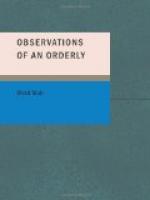It happens only too often that when a patient is discharged from hospital he is not fit to make his journey home alone. An orderly is detailed to accompany him. Sometimes the lot has fallen on me. Generally the trip is a short one, to some outlying suburb of London or to some town or village in the home counties; but sometimes my flights have been further afield, to Ireland, or Wales; and once I went to Yorkshire with a blind man.
That Yorkshire expedition was singularly lacking in drama and in surface pathos, yet its details remain with great clearness. The piece of damaged goods which, being of no further fighting use, was being returned with thanks to the hearthside from whence it came, was an individual answering to the unheroic cognomen of Briggs. A high-explosive shell had been sent by the Gods to alter the current of Briggs’s career. Briggs came through all that part of the war which concerned him without a scratch upon his person—only after the arrival in his immediate vicinity of the high-explosive shell he was unfortunately unable to see. Never again would Briggs be of the slightest value either as a soldier or in his civilian trade, which was that of driver of ponies in a coal-mine. Consequently, as a distinguished invalid (with the sum of one pound in his pocket to comfort him until such time as his pension should materialise), Mister—no longer Private—Briggs, for the first and presumably the last time in his existence, went travelling with a courier.
A car supplied by the National Motor Volunteer Service awaited Briggs and his courier at the hospital entrance. Here the introduction between Briggs and his courier took place. Ours is a large hospital, and I had never to my knowledge encountered Briggs before that moment. I beheld a young fellow (he was only twenty-three) with a stout, healthy visage which wore a pleasant smile and would have been describable as roguish, only ... well, the eyes of a blind man, whatever else they are, are not conducive to a roguish mien. They were eyes not visibly damaged: nice blue eyes. And they stared at nothingness. I was in the presence of a stripling who, a few weeks ago, must have owned a mobile face, and was in rapid process of developing a quite different face, a face which still might—it certainly did—grin and laugh, but which would gradually gain, had already begun to gain, a set expressionlessness that overlaid and strangely neutralised its grins and its laughter.
Blind men’s faces may have beauty, even vivacity, or a heightened intelligence and fire; but there is a something, hard to define, of which they are sadly devoid. The windows of the soul are dimmed. The face inevitably changes. And if even I, who knew not Briggs, could perceive that Briggs’s face must thus have changed, how much more conspicuous would the change be to the partner whom Briggs had left seven months before and to whom I was now leading him back—his wife.




